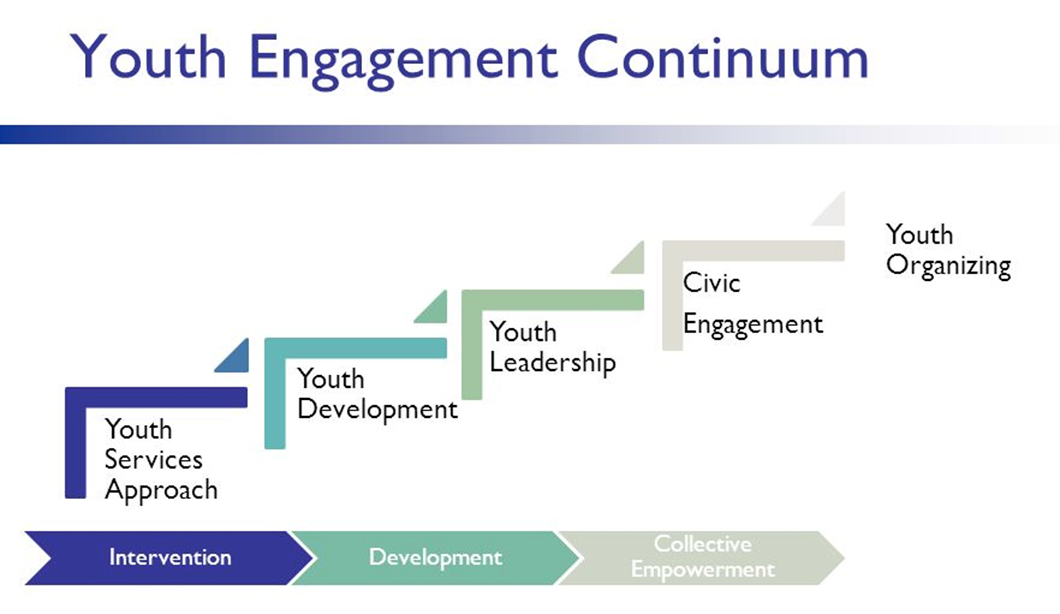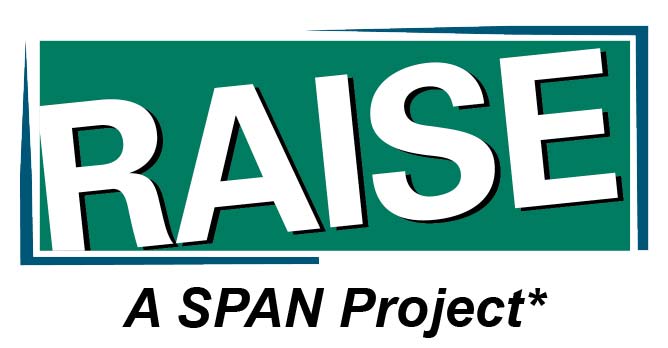youth engagement
Youth Engagement Toolkit Series
The RAISE Center created the Youth Engagement Toolkit Series to help inform the staff who are supporting youth engagement efforts and provide strategies and tips that help their respective organizations to implement or improve their youth engagement practices. Ultimately ensuring that organizations create programs and supports that are not doing things “to” or “for” a youth, but “with” them.
The toolkits were written and organized based on the steps of the Youth Engagement Continuum.

The RAISE Youth Engagement Toolkit Series
The Foundations of Youth Engagement and Parent Centers: This toolkit serves as an introduction to the concept of youth engagement and helps set the stage for an organization to move beyond the youth services approach and begin to consider the idea of youth development. Español PDF
Youth Development: This toolkit is designed to help staff members understand the competencies that youth should be working on and understanding in order to become effective leaders. Español PDF
Youth Leadership: This toolkit is designed to help staff members explore different leadership styles and then address concepts that promote effective leadership. Such as critical thinking, decision making, responsibility, and service to the community. Español PDF
Youth Individual Empowerment: This toolkit is designed to help staff encourage the empowerment of youth. Gaining an understanding of how adults can help youth understand the impact the youth voice can have on programs and projects. When youth feel valued they feel empowered. Espanol PDF
Youth Collective Empowerment: This toolkit is designed to help staff understand how to best support and empower a group of youth that will be working on shared projects. Offering a framework that addresses promoting teamwork, thinking as a collective, and building a diverse and inclusive community. Español PDF
Below are tip sheets (English/Spanish) and videos for Youth Engagement
(Videos below available in English and cc Spanish):
Factsheet #1 “Step #1 (PDF DOC) “Develop a Youth-Friendly Culture”: Create an open, welcome environment for youth.
Paso 1 (PDF DOC): “Desarrollar una cultura favorable a los jóvenes”: Fomenta una cultura abierta y acogedora para los jóvenes.
Factsheet #2 “Step #2 (PDF DOC) “Provide Information in Youth-Friendly Ways”: Don’t talk down but don’t use complex jargon either.
Paso 2 (PDF DOC) “Proporcionar informaccion de formas amigables para la juventud”: No seas condescendiente con la juventudo pero tampoco no utilices jerga compleja.
Factsheet #3 “Step #3 (PDF DOC) “Include Youth Voice at Every Level”: It’s not enough for youth to just be in the room.
“Paso 3 (PDF DOC) “Incluir la voz de los jóvenes en cada nivel”: No basta con que los jóvenes estén presentes en los espacios de discusión.
Factsheet #4 “Step #4 (PDF DOC) “Partner with Youth-Serving Organizations”: Reach out to groups you admire and find ways to combine efforts.
Paso 4 (PDF DOC) “Asociarse con organizaciones que prestan servicios a los jóvenes”: Comunicarse con grupos a los que usted admira y que encuentran maneras de sumar esfuerzos.
Factsheet #5 “Step #5 (PDF DOC) “Build Relationships with Youth”: Create opportunities for mentorship.
Paso 5 (PDF DOC) “Forjar relaciones con los jóvenes”: Crear oportunidades de programas de mentores.
A Change in Mindset: Being a Good Adult Ally to Foster Youth Engagement
Overview:
One of the key elements of youth engagement is creating a space where youth feel their actions and voice have value. Part of creating that environment is making sure the adults supporting those youth change their mindset from being the adult “in charge” to an adult ally that works in partnership with the youth to achieve group goals or activities. For many adults this shift in mindset feels unnatural, but working to become a good adult ally will increase youth engagement.
Below are some tips your Parent Center can use to shift to a more adult ally mindset:
Share the Power: An adult ally sees their relationship with youth as a partnership where collaboration is encouraged.
Support the Vision of Youth: As an adult ally it is important to help youth make their goals, plans, and suggestions become a reality. An adult ally can do this by:
-
-
-
- Connecting youth with resources and opportunities
- Coordinating the “behind the scenes” parts of an activity
- Making sure youth voice is at the table and heard. Avoid tokenism
-
-
Listen first, then Support: As professionals we are familiar with taking charge of situations, but as an adult ally it is essential to sit back and listen first. Let the youth express their ideas before offerings suggestions or support. Go with the flow.
Be a Possibility Thinker: As an adult ally it is important to set boundaries for the youth you are supporting. Be up front about what you as an adult ally can offer the youth in terms of resources and support, but always think in terms of possibilities not barriers.
